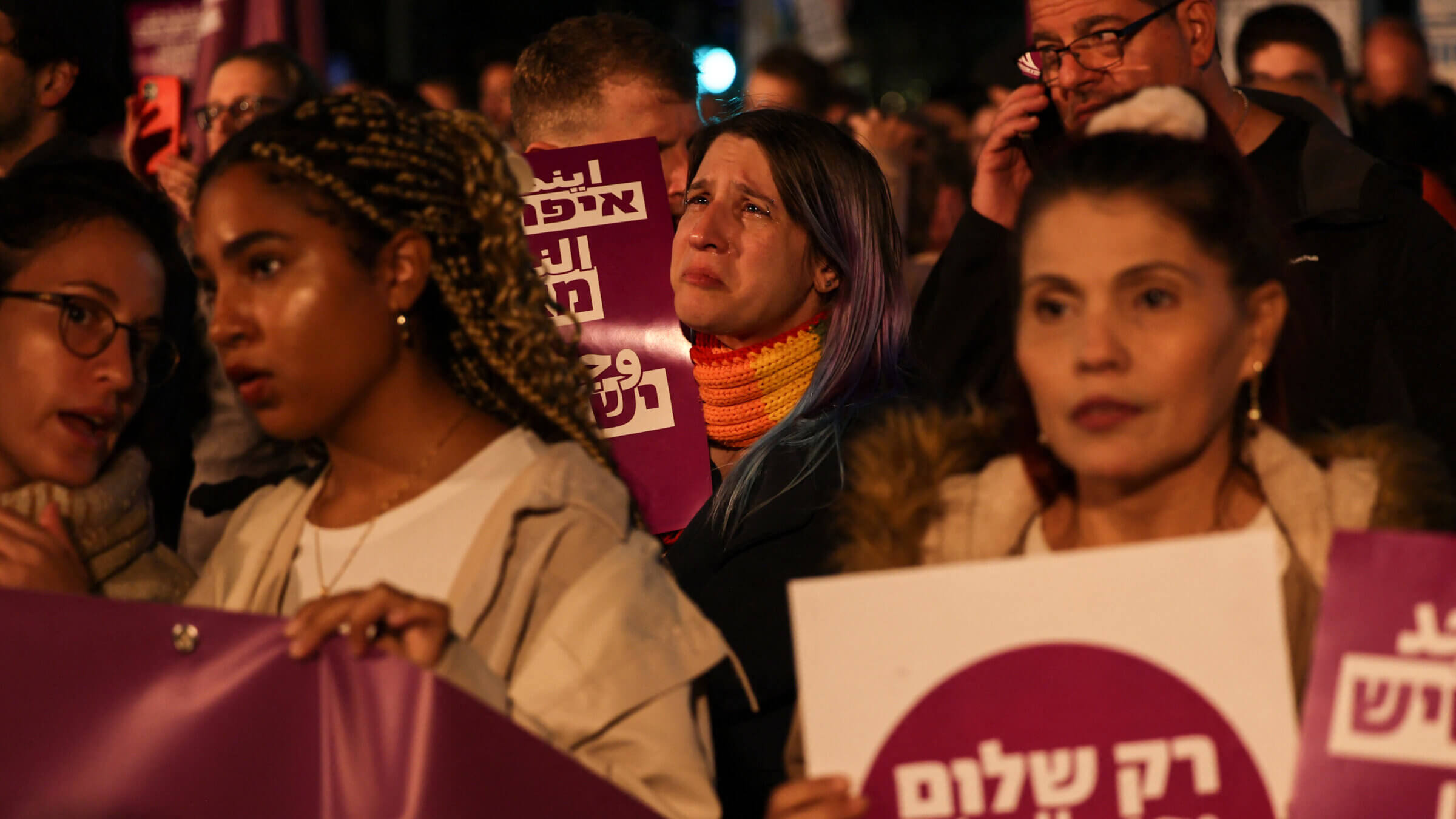Israeli-Palestinian peace group Standing Together pushes back after founding member of BDS campaign calls to boycott it
Standing Together, which has gained supporters in the United States since Oct. 7, rejected the call as “infuriating” and counterproductive

A demonstration organized by Standing Together, an Israeli-Palestinian peace movement, to demand a cease-fire in the ongoing war in Gaza. A wing of the global boycott movement targeting Israel accused the group of “normalization” Thursday. Photo by Getty Images
(JTA) — Palestinian activists within Israel and outside of it are arguing over whether to boycott a leading Israeli peace organization, and are accusing each other of playing into the Israeli government’s hands.
The public debate concerns Standing Together, a joint Jewish-Arab Israeli activist group with more than 5,000 members. The group has drawn international attention in recent months for being one of the loudest voices in Israel pushing for an end the Israel-Hamas war and for renewed efforts toward Israeli-Palestinian peace.
But last week, the Palestinian Campaign for the Academic and Cultural Boycott of Israel, or PACBI, issued a call for “conscientious people” to boycott Standing Together, charging it with seeking “to distract from and whitewash Israel’s ongoing genocide in Gaza.”
The group is a founding member of the anti-Israel Boycott, Divestment and Sanctions movement, known as BDS. Its statement came on the eve International Court of Justice’s preliminary ruling on South Africa’s genocide charge against Israel.
“By trying to paint Israel as a tolerant, diverse, and normal state, and focusing on ‘hatred’ rather than oppression as the problem, this organization is intellectually dishonest and outright complicit,” the statement said. “It is serving a key role in Israel’s international propaganda strategy at this time.”
Prior to the boycott call, Standing Together was already facing marginalization in Israel, where calls for a ceasefire have been rare and the vast majority of Israeli Jews support the conduct of Israeli soldiers. On Tuesday, the group’s Israeli Arab membership, identifying as Palestinian citizens of Israel, issued a statement denouncing PACBI’s boycott call and saying that it only contributed to what it called the Israeli government’s crackdown on antiwar voices.
“Our ability to speak, act, or effect change under a fascist government is already severely limited and seems to be diminishing further,” the statement said. “Efforts to silence and isolate Standing Together do not serve the Palestinian cause, they serve the interests of Israel’s political establishment, which is also attempting to silence us.”
The statement, which was unsigned and issued through a Standing Together social media account, said the group “has provided us and tens of thousands of Palestinian citizens of Israel a safe political refuge during these challenging times, a place to demand a ceasefire, grieve safely, and organize for a future where we are free and equal in our homeland.
The group’s leadership includes both Palestinian and Jewish Israelis. It is preparing for its upcoming leadership elections as well as a major “peace gathering” in Haifa this week.
Standing Together has found a new audience, since Hamas’ Oct. 7 invasion sparked the war, for its vision of “peace, equality, and social and climate justice.” Inside the country, the group has seen attendance at its rallies grow, although it lacks supporters in Israel’s parliament as well as a plan to implement its ideas on a wide scale. Abroad, the group has found new fans on social media, particularly after two of its leaders, Alon-Lee Green and Sally Abed, embarked on a U.S. tour.
Its prominence has made it a target of Palestinians who oppose any initiatives that engage with Israel as a legitimate country. Founded in Ramallah in 2004 by a group of Palestinian academics, PACBI has long opposed efforts for Jewish Israelis and Palestinians to work together on those grounds. In 2009, the group’s opposition to a joint Israeli-Palestinian musical tour by Leonard Cohen led to the cancellation of his planned concert in Ramallah after several shows in Israel.
The group’s criticism of Standing Together elicited an array of responses last week, both on social media and on an internal Whatsapp group for Standing Together members in the Tel Aviv area.
On the WhatsApp group, some said they saw the statement as an opportunity for self-reflection and growth, while others dismissed the BDS movement and its member groups as out of touch with reality on the ground in Israel.
On X, formerly Twitter, Monica Marks, a professor of Middle East politics at NYU Abu Dhabi who supports Standing Together, described PACBI’s statement as “counter-productive, circular firing squad purism.”
Ahmed Fouad Alkhatib, who describes himself as a “Proud American from Gaza City” who is “pro-Palestine, anti-Hamas & violence,” harshly criticized the statement in a lengthy post on X.
“The movement is doing tremendous harm to the pro-Palestine movement by attacking Jewish and Israeli allies and is an increasingly fringe, radical effort that is going nowhere. Engaging with diverse Jewish/Israeli audiences, and yes, that includes pro-Israel Zionists, should be normalized, not criminalized,” he wrote.
“They’re trying to operate within the mainstream landscape to be effective and become a political home for diverse Israeli audiences disillusioned with the Netanyahu/rightwing regime,”Alkhatib added, referring to Standing Together. “That’s how you build effective power, not by appealing to fringe elements within the BDS/pro-Palestine movement.”
This article originally appeared on JTA.org.














